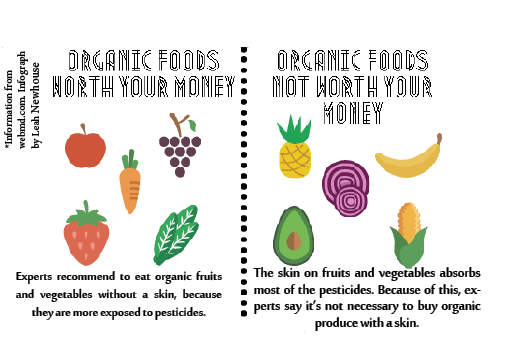To eat or not to eat: Is organic food worth it?

February 26, 2016
It has been more than five years since she started, and now it would be hard for her to stop eating it. It started with basic staple foods for her, which including milk, eggs, yogurt and chicken.
“When it comes to these items, it’s so much better for your body to simply remove the antibiotics and hormones, that would otherwise be in them,” senior Delaney Bucker said.
Although organic foods can cost 50 to 100 percent more than non-organic foods, Bucker and her family turned to these produce items for the healthier aspect. Bucker says her family would much rather pay the extra cash then digest the additives put into regular produce items.
Along with Bucker, sophomore Megan Hammonds believes that organic food is worth the extra bucks. Hammonds says that because there are less pesticides she believes organic food is healthier for you. Foods containing seeds are what Hammonds buys organic mostly.
“I buy the ones that are organic that have seeds in them because they absorb the pesticides more,” Hammonds said.
According to Healthychild.org, there are six steroidal hormones approved by the FDA, and even though steroid use in poultry is banned, that does not stop producers from using them. It also states that 80 percent of antibiotics in the U.S. are used for livestock. Often the animals are given these antibiotics to increase production, and help the animal stay healthy in their environmental conditions.
Bucker says that there is a difference in the taste of organic foods compared to non-organics. When she started drinking non-organic milk she noticed a contrast in the consistency.
“Other people probably do not realize it because they drink it so often, but the organic milk has a consistent taste all year round because it is not forced out of the animal,” Bucker said.
Bucker explained the same concept is why she switched to organic eggs. She has become accustomed to “free-range or organic eggs” and there is no way she could transition back to regular hormone fed chickens.


